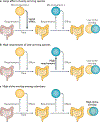Role of priority effects in the early-life assembly of the gut microbiota
- PMID: 29362469
- PMCID: PMC6813786
- DOI: 10.1038/nrgastro.2017.173
Role of priority effects in the early-life assembly of the gut microbiota
Abstract
Understanding how microbial communities develop is essential for predicting and directing their future states. Ecological theory suggests that community development is often influenced by priority effects, in which the order and timing of species arrival determine how species affect one another. Priority effects can have long-lasting consequences, particularly if species arrival history varies during the early stage of community development, but their importance to the human gut microbiota and host health remains largely unknown. Here, we explore how priority effects might influence microbial communities in the gastrointestinal tract during early childhood and how the strength of priority effects can be estimated from the composition of the microbial species pool. We also discuss factors that alter microbial transmission, such as delivery mode, diet and parenting behaviours such as breastfeeding, which can influence the likelihood of priority effects. An improved knowledge of priority effects has the potential to inform microorganism-based therapies, such as prebiotics and probiotics, which are aimed at guiding the microbiota towards a healthy state.
Conflict of interest statement
Competing interests statement
The authors declare no competing interests.
Figures




References
Publication types
MeSH terms
Grants and funding
LinkOut - more resources
Full Text Sources
Other Literature Sources

